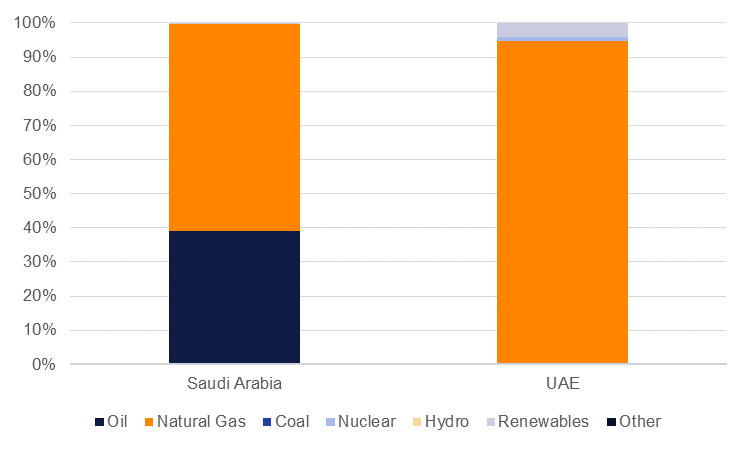
Several GCC economies have now made net-zero carbon emissions pledges ahead of the COP 26 climate summit to be held in the UK at the end of October. The UAE is committing to a target of 2050 when its economy will produce net-zero emissions while Saudi Arabia and Bahrain have targeted a date of 2060. The three countries stand out as the first among major economies in the Middle East and North Africa to publicly commit to a net-zero target and also as they collectively represent around 13% of total global oil production.
To reach their net-zero goals, Gulf economies will likely target regional power generation in a first instance as it remains dominated by gas and oil-fired generation. In Saudi Arabia, gas-fired generation accounted for more than 60% of total power in 2020 while oil-fired generation represented much of the remainder. In the UAE, natural gas still accounts for more than 90% of total power generation although the pace of renewables investment is starting to make itself felt, with renewables providing 4% of total generation in 2020 compared with 3% a year earlier. Increasing the share of renewables in the power mix is already a stated strategy in both Saudi Arabia, which plans to have 50% of its power mix met by renewables by 2030, and the UAE which has a 50% clean energy target set for 2050.
 Source: BP Statistical Review of World Energy 2021, Emirates NBD Research
Source: BP Statistical Review of World Energy 2021, Emirates NBD Research
Carbon capture, utilization and storage (CCUS) will also provide a major avenue to achieve regional carbon targets and has been an option that has been promoted by hydrocarbon-dependent economies and companies to hit climate goals. Carbon is captured from industrial operations and then stored, often in depleted oil and gas reservoirs, or used in processes where CO2 is an input. The UAE already makes use of CCUS technology in steel production where the captured CO2 is used in enhanced oil recovery. Expanding the offtake potential for CO2 produced by CCUS can also provide a longer-run economic opportunity for regional economies.
The challenge to clean up the region’s energy footprint is clear. On a per capita basis the UAE and Saudi Arabia stand far ahead of major developed and emerging markets in terms of carbon emissions given the highly energy intensive requirements of their economies. Extensive air conditioning systems and large construction industries lead to high levels of emissions while relatively more affordable fuel prices also allow for the operation of larger engine capacity vehicles. Fast levels of population growth—ahead of the Covid-19 pandemic—have also contributed to a rapid pace of emissions growth which historically have far outpaced global growth, even when including the rapid gains seen in China.
 Source: BP Statistical Review of World Energy 2021, IMF, Emirates NBD Research
Source: BP Statistical Review of World Energy 2021, IMF, Emirates NBD Research
Notably though, the net-zero emissions targets won’t impact the GCC economies’ ability to produce and export oil and gas. Emissions from running an engine powered by gasoline refined from Saudi or UAE oil will count in the country where they are generated, not where the original material was sourced. Indeed, the UAE and Saudi Arabia have official targets of increasing their oil production capacity. There remains a substantial challenge then in pursuing a domestic net-zero target while effectively exporting emissions to countries that may not be pursuing climate goals as aggressively. Both Saudi Arabia and the UAE are also trying to maintain a competitive edge in global energy markets through investment into production of hydrogen which could replace oil products and natural gas in many applications.
GCC emissions remain a small share of global
The announcements from the GCC economies ahead of COP 26 will likely be welcomed but collectively Saudi Arabia, the UAE and Bahrain account for less than 3% of total global CO2 emissions. More aggressive targeting of CO2 reduction will need to come from developed markets and large emerging economies to achieve the Paris Agreement's preferred goal of keeping temperature increases to 1.5 degrees Celsius above pre-industrial levels. According to the International Energy Agency’s recent assessment, the world is falling short of hitting the higher 2 degrees Celsius target outlined in the Paris Agreement under both its stated policies and announced pledges scenarios and will fall well short of hitting the 1.5 degrees goal.
In the near term, the new net-zero targets from the UAE, Saudi Arabia and Bahrain are unlikely to have a noticeable effect. But a dramatic shift in climate targets at an international scale in the name of reducing the impacts of global warming would likely come at the expense of many economies in the GCC and broader Middle East as oil and gas demand is severely curtailed.